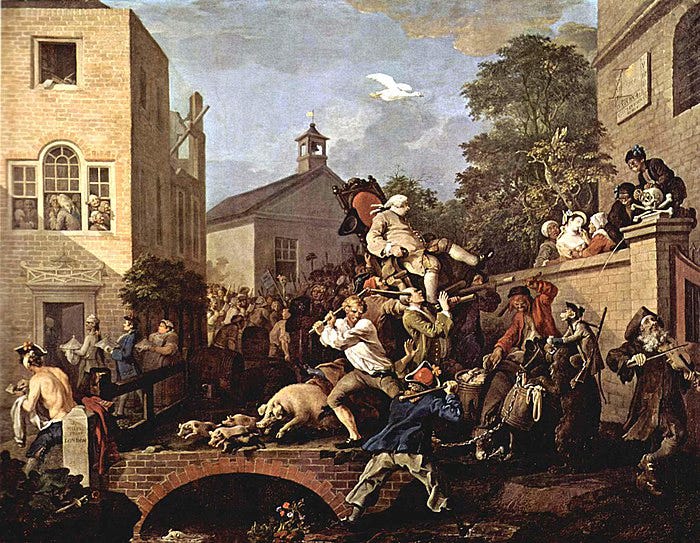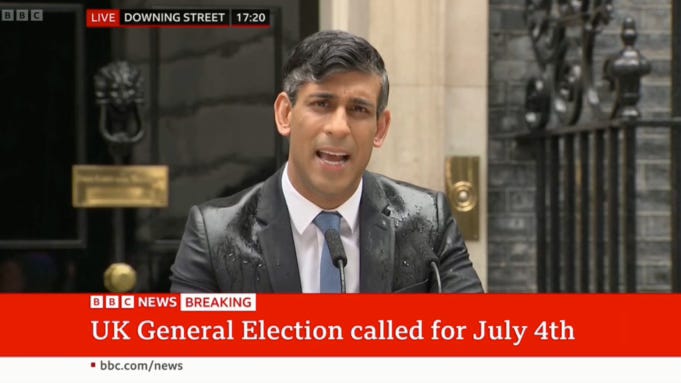Beware the hot take election
Things you need to ignore before July 4th
I love elections but I hate election campaigns. Elections are full of numbers and results which, unless you are a US Republican, are unarguable. They leave the political analysts with the job of working out why the outcome came out in the way it did, which can be interesting, and the policy analysts with the job of working out what comes next, which can be consequential. Election night itself is exciting and often dramatic.
This is the 19th general election of my life. The first two I wasn’t sentient for but the third marked the beginning of my journalistic career as I announced on our primary school radio station that Labour had won the 1964 election, that on the same day Nikita Khrushchev had been deposed and that China had just exploded its first atomic bomb. Of the first 18 national votes only six were “change” elections. By July 5th that should be seven out of 19.
As a boy I was romanced by the stats and details of election day – the exotic names of constituencies, their different personalities. In 1964 two of the three main party leaders represented seats north of Dundee: Orkney and Shetland and Kinross and Western Perthshire. In the 2019 general election Dan Carden won Liverpool Walton with a Hoxhaian 84.7% of the vote; in 2015 Alasdair McDonnell of the SDLP squeaked in in Belfast South with 24.5%; in 2017 the SNP’s Stephen Gethin won North East Fife by two votes. Almost all the highest increases of votes in a general election – 30% plus - were also recorded by the SNP in 2015. And so on.
Results are fascinating. Campaigns on the other hand are mostly tedious nonsense, and this one is no exception. Worse, thanks to Rishi Sunak, this campaign is a long one, as well as one with (barring a Labour catastrophe) a pre-ordained result. But specialist political journalists, commentators, pundits and radio, TV and Youtube programmes are so ubiquitous and have so much time to fill, that there is a constant search for new narratives and plot points to fill the yawning space. The preferred stories are those that require no deep diving – or even snorkelling – to understand.
And then there are the hot takes and the orphan takes – the sudden insights which the authors present as setting them above others in their prophetic perspicacity or else damning unspoken rivals for erroneous claims which no one actually ever made. We’ll come on to a few recent hot takes in a moment, but first I’ll take on some of the Great Statements about elections that I think are almost invariably mistaken.
Great Statements that are wrong
One: “Elections are a good time to engage the public in the discussion of policies.”
No, they really aren’t. In fact they are practically the worst time. The parties have carefully worked out their attack lines, defence lines and key statistics and their spokespeople will stick to these like limpets, whatever the interrogatory weather. This makes any attempt to move beyond a limited number of banal iterations almost impossible. The fictional £2000 Labour tax hike is a perfect example, where almost the entire and complex area of fiscal policy has been reduced to a battle over a single manufactured figure.
Meanwhile areas that are important but that the parties deem to be unlikely to win them votes or to stick in the public consciousness go almost completely undiscussed: prisons, justice, public health, investment strategies and (God help us) Europe. And many more. Manifestos are mostly only read by the other parties, searching for hostages to fortune. The main broadcasters are stymied in their attempts to break out of this presentation straitjacket by their understanding of their impartial role in an election. Who are they to decide that the key issue is X, when all the parties are arguing about Y?



